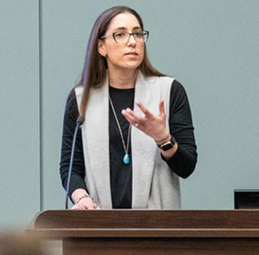
Lara is a recognized leader in journalism education who has demonstrated excellence in teaching, scholarship and service. She is dedicated to advancing the practice and discipline of journalism.
Her research focuses on science communication, creating sustainable higher education journalism programs and building connections between academia and industry. She and her research collaborator founded the term "news-academic partnerships," now used industry-wide. She studies such partnerships as sustainable business models for local news and as a hydration source for news deserts. As a seasoned expert in teaching and learning pedagogy, she has built and strengthened writing, multimedia storytelling, media and health literacy, and journalism curriculum for K-12 and university-level programs.
COURSES
Foundations of Journalism
Description: Providing students with an introduction to journalism, this course examines what news is, defines news principles and traces the development of print journalism in the US. This course offers students a practical introduction to news gathering and writing techniques, including writing under pressure, the principles of good writing and the ethics of journalism.
Media Law & Ethics
Description: This course provides an overview of the ethical conflicts faced in contemporary society by media professionals. Through the application of various legal and ethical frameworks, students consider the traditional and contemporary problems of expression and dissemination of information in a converged world.
Media & Culture
Description: This course provides an introduction to the function and impact of mediated and mass communication in society, and explores the history and contemporary landscape of radio, television and film. Related mass communication theories, new technologies, media effects and ethical issues are addressed.
Feature Writing
Description: This course examines feature writing through reading and analyzing digital and multimedia storytelling feature pieces. Students develop skills in feature writing through traditional and contemporary forms of news gathering techniques and create original stories.
Multimedia Journalism
Description: This course provides a comprehensive overview of digital journalism, its history, its structure, its economics, its tools, its relationship with society and culture. An added emphasis is placed on hands-on learning through relevant assignments that reflect key concepts in information society, technology, and journalism.
Data Journalism
Description: This course is designed to acquaint students with the ways in which data is used to inform reporting in the journalism field. Students will learn tools and frameworks for data mining, analysis, and visualization. Students will be challenged to improve their understanding of numbers and quantification for the purpose of communicating to a consumer audience.
Broadcast Journalism
Description: This course provides an introduction to understanding the variety of elements that go into reporting and producing for radio and television. The emphasis is placed on field producing and reporting, as well as on vocal delivery and on-camera performance for a variety of program types and broadcast situations.
Reporting on Public Health Issues
Description: This course is designed to acquaint students with all aspects of the health beat and teach them how to write compelling narratives about global health issues with an emphasis on the U.S. healthcare system, investigate wrongdoing in health and medicine, and interpret health in political, socio-economic and medical contexts in ways that serve the public interest. Since health is one of journalism’s most complex and important reporting beats, students will learn how health care intersects politics, economics, medicine and disease, business finances, marketing and sales practices, consumer regulation and the law.
Politics, People & the Press
Description: This course will place a critical focus on the media industry in light of the current political landscape. Students will gain a perspective on trials facing the journalism industry and its practitioners and the anticipated challenges ahead of presidential elections. Students will also analyze news framing of candidates and important vote-moving issues including immigration, health care, and gun control. This course will also examine social and ethical issues in the era of source hacking and fake news, and the influence of news and information on individuals and communities. Students will examine psychology theories that help contextual how audiences receive and perceive messages by both political figures and the press. The role of the journalist and how journalism defines “events of the day” will be analyzed from a variety of perspectives.
Health Communication
Description: This course provides students with an overview of the health communication field. Students will explore multiple communication issues relevant to health organizations including written and oral communication, information processing, the social construction of health and illness, doctor-patient communication, and the relationship between professionals, patients, friends, families, and cultural institutions. The course will also explore the role media play in shaping our health attitudes, perceptions, and behaviors. Finally, the course will explore the strategic planning process involved in developing health campaigns.
Thesis/Capstone: Journalism/Film
Description: Students studying journalism and film review and synthesize literature related to their areas of focus, conduct research, and develop research proposals or plans for creative projects. The result is a culminating project of major importance requiring students to integrate industry-related skills and knowledge acquired in the classroom and in the field.
Her research focuses on science communication, creating sustainable higher education journalism programs and building connections between academia and industry. She and her research collaborator founded the term "news-academic partnerships," now used industry-wide. She studies such partnerships as sustainable business models for local news and as a hydration source for news deserts. As a seasoned expert in teaching and learning pedagogy, she has built and strengthened writing, multimedia storytelling, media and health literacy, and journalism curriculum for K-12 and university-level programs.
COURSES
Foundations of Journalism
Description: Providing students with an introduction to journalism, this course examines what news is, defines news principles and traces the development of print journalism in the US. This course offers students a practical introduction to news gathering and writing techniques, including writing under pressure, the principles of good writing and the ethics of journalism.
Media Law & Ethics
Description: This course provides an overview of the ethical conflicts faced in contemporary society by media professionals. Through the application of various legal and ethical frameworks, students consider the traditional and contemporary problems of expression and dissemination of information in a converged world.
Media & Culture
Description: This course provides an introduction to the function and impact of mediated and mass communication in society, and explores the history and contemporary landscape of radio, television and film. Related mass communication theories, new technologies, media effects and ethical issues are addressed.
Feature Writing
Description: This course examines feature writing through reading and analyzing digital and multimedia storytelling feature pieces. Students develop skills in feature writing through traditional and contemporary forms of news gathering techniques and create original stories.
Multimedia Journalism
Description: This course provides a comprehensive overview of digital journalism, its history, its structure, its economics, its tools, its relationship with society and culture. An added emphasis is placed on hands-on learning through relevant assignments that reflect key concepts in information society, technology, and journalism.
Data Journalism
Description: This course is designed to acquaint students with the ways in which data is used to inform reporting in the journalism field. Students will learn tools and frameworks for data mining, analysis, and visualization. Students will be challenged to improve their understanding of numbers and quantification for the purpose of communicating to a consumer audience.
Broadcast Journalism
Description: This course provides an introduction to understanding the variety of elements that go into reporting and producing for radio and television. The emphasis is placed on field producing and reporting, as well as on vocal delivery and on-camera performance for a variety of program types and broadcast situations.
Reporting on Public Health Issues
Description: This course is designed to acquaint students with all aspects of the health beat and teach them how to write compelling narratives about global health issues with an emphasis on the U.S. healthcare system, investigate wrongdoing in health and medicine, and interpret health in political, socio-economic and medical contexts in ways that serve the public interest. Since health is one of journalism’s most complex and important reporting beats, students will learn how health care intersects politics, economics, medicine and disease, business finances, marketing and sales practices, consumer regulation and the law.
Politics, People & the Press
Description: This course will place a critical focus on the media industry in light of the current political landscape. Students will gain a perspective on trials facing the journalism industry and its practitioners and the anticipated challenges ahead of presidential elections. Students will also analyze news framing of candidates and important vote-moving issues including immigration, health care, and gun control. This course will also examine social and ethical issues in the era of source hacking and fake news, and the influence of news and information on individuals and communities. Students will examine psychology theories that help contextual how audiences receive and perceive messages by both political figures and the press. The role of the journalist and how journalism defines “events of the day” will be analyzed from a variety of perspectives.
Health Communication
Description: This course provides students with an overview of the health communication field. Students will explore multiple communication issues relevant to health organizations including written and oral communication, information processing, the social construction of health and illness, doctor-patient communication, and the relationship between professionals, patients, friends, families, and cultural institutions. The course will also explore the role media play in shaping our health attitudes, perceptions, and behaviors. Finally, the course will explore the strategic planning process involved in developing health campaigns.
Thesis/Capstone: Journalism/Film
Description: Students studying journalism and film review and synthesize literature related to their areas of focus, conduct research, and develop research proposals or plans for creative projects. The result is a culminating project of major importance requiring students to integrate industry-related skills and knowledge acquired in the classroom and in the field.

